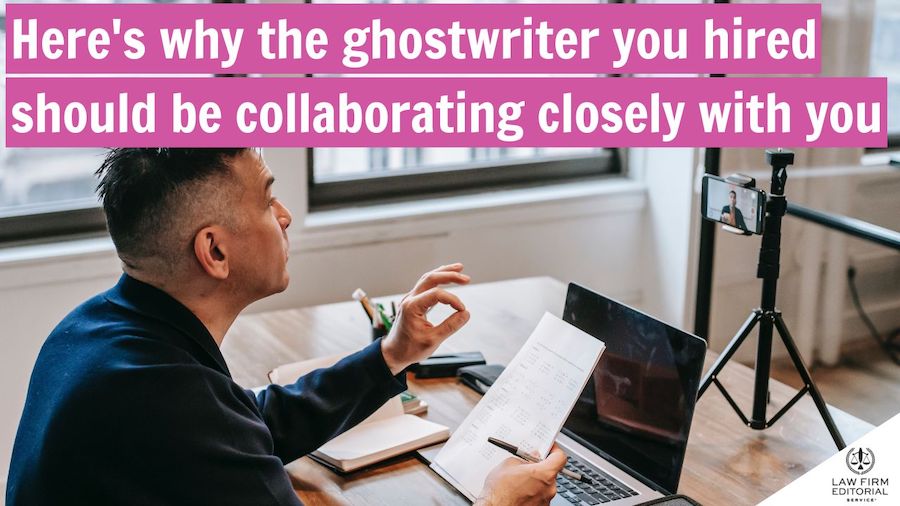It sounds counterintuitive, but collaboration is a key ingredient in successful ghostwriting relationships.
Collaboration is key when working with ghostwriters of all kinds, but especially with ghostwriters who craft thought-leadership marketing content like blog posts, bylined articles, and client alerts.
I know it sounds counterintuitive— you have collaboration on one hand and ghostwriters on the other. After all, isn’t the whole point of a thought-leadership marketing ghostwriter for a person to hand off an important component of their marketing and business development efforts—the drafting of blog posts, bylined articles, client alerts, and other thought-leadership marketing content—to somebody else so that they can focus on client-related matters and other tasks at hand?
Yes, of course, that’s the point of ghostwriting. But in order to have a productive relationship with a ghostwriter that results in the ghostwriter producing great content that is consistent with your vision for what that content should say, well then, you and the ghostwriter need to collaborate.
Effective collaboration between a ghostwriter and their client tends to occur on both the front end and the back end of the writing process.
Collaborating on the front end
On the front end, it’s important for the client and the ghostwriter to discuss where the client wants to go with a particular piece of content.
What’s the thesis?
Who are we talking to?
What do we want that audience to do, if anything, after reading the content?
What takeaways are we leaving them with?
Are we telling that audience how to do something? Or are we advising them about a development in their industry and giving our take on why it is important and what it means for them moving forward?
If this front-end collaboration doesn’t occur, the client and ghostwriter are asking for trouble. If the client simply gives the ghostwriter a topic to write about without discussing the client’s perspective, there’s a good chance that the ghostwriter will craft a piece of content that does not align with what the client wanted to communicate, no matter how talented the ghostwriter is or how knowledgable they are about the topic the client has them writing about.
For this reason, it’s important that a ghostwriter speak with their client before beginning the writing process to make sure they are in agreement on how they will cover the topic the client has sought the ghostwriter’s assistance with. This conversation need not be long. It shouldn’t take more than about 30 minutes. Of course, it falls on the ghostwriter’s shoulders to make sure that the piece of content is written in a way that is engaging, persuasive, and conveys the message the client wants to convey.
Collaborating on the back end
On the back end, the collaboration between a client and a ghostwriter comes in the form of the former reviewing the latter’s work. The client will be making sure that the ghostwriter conveyed what the client wanted them to convey, and did so in a well-written style and easy-to-understand manner.
This collaboration is necessary for a client’s substantive quality control process. But it is also necessary for ethics reasons. A client who is involved in the front-end planning and back-end review, revising (if necessary), and approval of a ghostwritten piece of content is going to be on stronger ethical ground when they publish that piece of content with their byline on it than a client who defers entirely to a ghostwriter without providing any direction.
On a case-by-case basis, collaboration between a client and a ghostwriter is necessary to ensure the final product is both high-quality and consistent with the message the client wants to disseminate.
Better, Faster, Stronger
But a funny thing happens as a client and ghostwriter continue working together on additional projects. The ghostwriter begins to better understand the client’s view of the world, writing style, and writing voice. With this knowledge, the ghostwriter becomes more effective and more efficient because they are more familiar with their client’s preferences. The ghostwriter also earns more of the client’s trust with each completed piece of content.
This increased effectiveness, efficiency, and trust is a win-win for both the client and the ghostwriter. The client appears to be prolific because they are publishing more and more content. And the ghostwriter earns more business from the client (and perhaps is referred business from that client) because the partnership is working so well.
So yes, it does sound a bit counterintuitive for collaboration to be a necessary component of a ghostwriting relationship. But when clients and ghostwriters discover the benefits of collaboration, and how it is a tide that lifts both of their boats, they will wonder how they could have ever developed a mutually beneficial working relationship without it.
Bottom line: It sounds counterintuitive, but collaboration is a key ingredient in successful ghostwriting relationships.
Contemplating engaging a ghostwriter to ethically collaborate with your firm’s lawyers to write and publish blog posts, bylined articles, client alerts, and the like? Click here to schedule a 30-minute Content Strategy Audit to learn if collaborating with an outside writer is the right move for you and your law firm.

